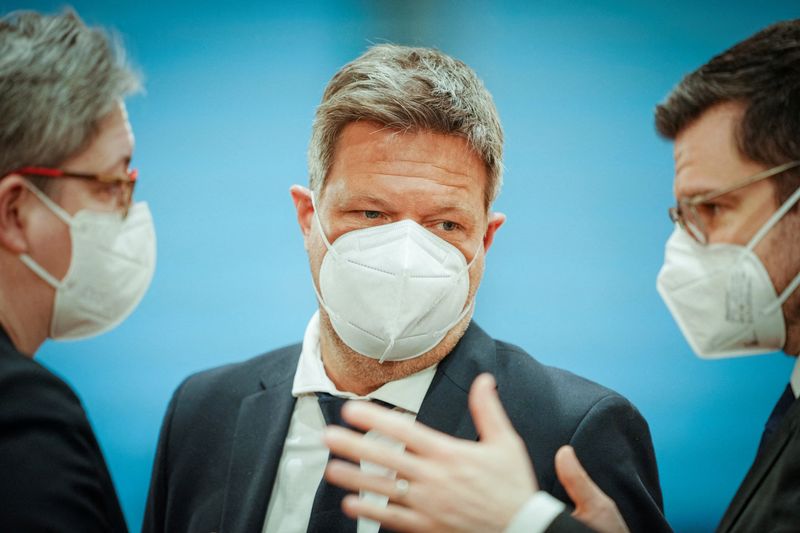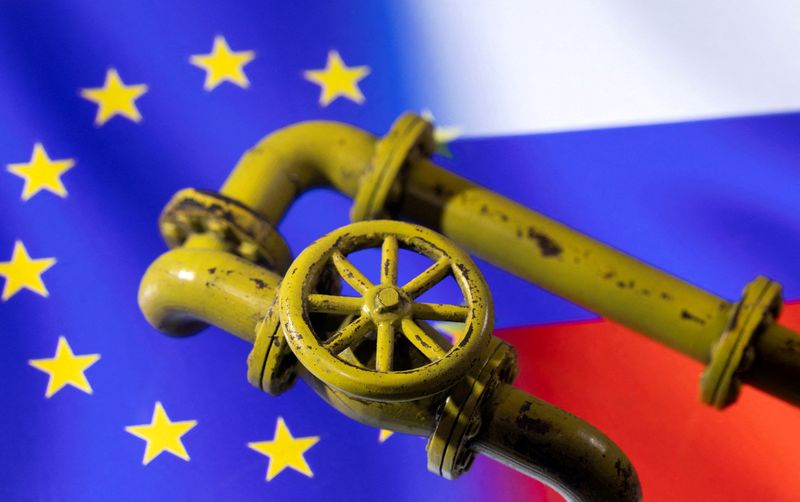By Kate Abnett and Susanna Twidale
BRUSSELS/LONDON -Fears of a Russian gas supply crunch prompted some European countries on Wednesday to ask people to consume less energy in a move that could potentially yield big results.
Despite months of soaring energy prices and tight supplies most governments have avoided taking a step they fear could be unpopular but with concerns growing that Russia could turn off the taps, the message in some capitals is starting to shift.
“Every kilowatt-hour counts,” German Economy Minister Robert Habeck said on Wednesday as Germany declared an “early warning” of a possible gas supply emergency.
The International Energy Agency (IEA) in Paris agrees that when done on a large scale, small behavioural changes can significantly reduce gas and oil demand.
It estimates that turning down thermostats in buildings across the European Union by 2 Celsius would save 20 billion cubic metres of gas, worth about $28 billion at current prices.
That’s also about 13% of the 155 billion cubic metres the 27-nation bloc buys each year from Russia, which is in turn about 40% of the EU’s total gas consumption.
The Dutch government followed Germany on Wednesday saying it would launch a campaign this weekend asking citizens and businesses to use less gas while France’s regulator asked citizens to collectively try to reduce their consumption.
Simone Tagliapietra, senior fellow at think-tank Bruegel, said governments should have urged citizens to curb energy use months ago to help manage the supply crunch but politicians resisted because such a message “smells of austerity”.
“Each billion cubic metre of gas we don’t consume, it’s important. That gas is very expensive, and we need now to start filling up the storage ahead of next winter,” he said.
IT’S YOUR CHOICE
Rather than calling on consumers to cut their energy use, governments have so far mostly been looking for ways to cap utility bills and find alternative sources of fuel.
Sweden, France, Itay, Germany and Britain also announced measures to make petrol cheaper this month after crude hit its highest price since 2008, drawing criticism from campaigners who say the measures are fossil fuel subsidies.
But since Russia invaded Ukraine last month, Brussels has declared a mission to cut the EU’s Russian gas imports by two-thirds this year and to end the use of Russian gas by 2027.
Cutting demand could reduce the impact of any supply crunch if Russia were to cut exports, which has become more of a worry since Moscow said last week that countries should start paying for gas in roubles.
A detailed EU plan to wean itself off Russian fossil fuels is due in May, but a blueprint published this month showed Brussels would boost non-Russian gas imports, expand renewable energy faster, swap millions of gas boilers for heat pumps and renovate buildings to use less energy.
Those solutions will take time, however, and the European Commission has already suggested that consumers could help dent demand immediately.
“Your choices in how much energy you consume co-decide how strong we are in our reaction to Russia,” EU climate policy chief Frans Timmermans said.
Temporarily cutting demand would also help countries build up gas storage for next winter and provide a stop-gap while governments secure lasting options to replace Russian fuel – such as building wind and solar farms, renovating buildings, or securing more non-Russian gas.
“There are tracks for immediate energy savings measures that remain unexplored,” said Adeline Rochet, policy expert at climate think-tank E3G.
If they stick, energy-saving habits such as turning off lights and appliances or using less air conditioning where convenient, could also help bring down carbon dioxide emissions.
MOVE TO THE SLOW LANE
Christina Demski, an expert on consumer energy behaviour at Cardiff University’s School of Psychology, said soaring energy bills and a desire to show solidarity with Ukraine may mean Europeans are receptive to such messages.
“People are more likely to make a behavioural change if you are asking to do something that reflects their values,” she said, adding that requests to change behaviour should not target vulnerable households who lack the flexibility to adapt their consumption, or who are already struggling with bills.
Only a few countries have broached the idea of ways to reduce oil consumption, despite the fact Russia, which calls its action in Ukraine a special military operation, providing 27% of the EU’s oil imports.
Denmark is looking at a proposal to temporarily reduce highway speed limits. Ireland’s transport minister Eamon Ryan, who also the environment portfolio, suggested driving slower could save fuel when announcing a cut in petrol duty this month.
The IEA last week published options it said could lower oil demand in advanced economies by 2.7 million barrels per day (bpd) within four months, equivalent to the combined demand of every car in China.
Most options would require consumers to change their behaviour.
Lowering speed limits by 10 km per hour in advanced economies could save 290,000 bpd from cars and 140,000 bpd from trucks. Working from home three days a week would cut 500,000 bpd while fuel-saving practices such as car-sharing could save 470,000 bpd, the IEA said.
Some governments are resistant. Britain, which is no longer an EU member, rejected the IEA’s ideas. The country plans to replace the 8% of oil imports it gets from Russia with alternative supplies this year.
“There is absolutely no need to apply this guidance in the UK,” a government spokesperson said.
(Reporting by Kate Abnett and Susanna Twidale; Additional reporting by Padraic Halpin and Jacob Gronholt-Pedersen; Editing by David Clarke)

